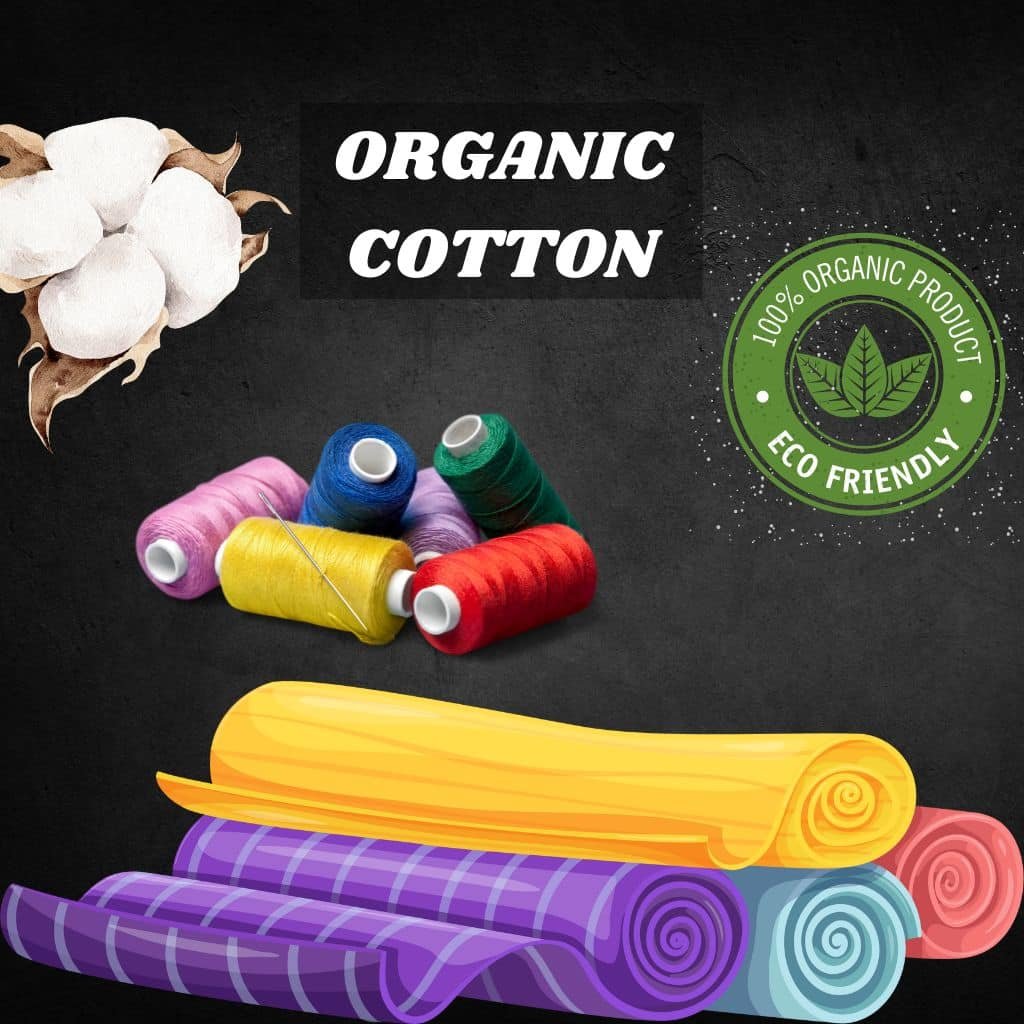The fashion has experienced many changes over the years and the most notable is the improvement of the industry into more friendly and sustainable materials. There are several advantages of Organic cotton as compared to conventional cotton. But in what way is the fashion industry utilizing the Natural cotton and why should their consumers even care.
Natural cotton farmers do not use synthetic chemicals, pesticides, or genetically modified organisms, which helps keep the ecosystem and stakeholders healthy. The review focuses on the overview of the textile industry and pure cotton, its benefits and challenges, and prospects of sustainable fashion trends.
Table of contents
Understanding Organic Cotton
Now that we have established what Natural cotton is, let us explore emerging trends in organic cotton and how these changes are transforming the fashion industry today. To begin with, Natural cotton is grown under environmentally safe methods that do not involve destruction of nature. Such methods don’t involve the use of any poison, they build up the soil and protect different types of animals. Such high standards mean safer materials, while at the same time improving the supply of green products that are in large demand.

What is Organic Cotton?
The Natural cotton is cultivated in a manner that is friendly towards the environment. It consists of agricultural techniques such as rotation and natural fertilization to avoid soil degradation as well as global warming. Farmers who cultivate pure cotton are normally certified by institutions like GOTS to meet strict global standards in environmental sustainability and ethical practices.
Table of contents
Organic vs. Conventional Cotton
Conventional cotton farming is damaging as it leads to poor water management, intense pesticide use and land exploitation, all contributing to environmental degradation. Compare this with the Natural cotton which is grown through methods that are water reducing, increasing land productivity and devoid of toxic chemicals. Not only does this benefit the environment but also guarantees the safety of farmers and workers from poisonous materials.
How Organic Cotton is Changing the Fashion Industry
The proliferation of Natural cotton has been key in the strides made towards ethical fashion. Due to the increasing demand for and concern about the environment, brands have started to add Natural cotton in their ranges of products. This revolution is changing the entire fashion supply chain from the procurement of the materials to their production and sale.
Sustainable Production Practices
Natural cotton farming helps in lessening the footprint that the fashion industry has on the environment. This contrasts with regular cotton production, which involves huge amounts of water and a lot of toxic pesticides, as Pure cotton only uses natural pest management and less water. This not only spares important resources, but also reduces pollution, and protects the environment.
Ethical Labor and Fair Trade
This is of particular importance because one of the changes that Pure cotton is bringing to the fashion industry is the end of exploitation of labor. There are fair trade issues that guarantee the workers involved in the production of Pure cotton are equally able to work under fair conditions. In this case the pure cotton supply chain improves the industry by protecting the people working in the supply chain and offering the end consumers fair prices due to ethics on invasion of human rights.
Reducing Fashion’s Environmental Impact
Fashion is one of the frontrunners in the second place for depletion and degradation of water and carbon resources, income; in this case, it constitutes one of the largest customers per capita. In that case, it is obvious that natural cotton requirements do not make a positive contribution to this activity. Moreover, even without using pesticides in cotton farming, farmers can help reduce the environmental burden of this industry by avoiding harmful chemicals and allowing the crops to consume less water. Therefore, it is apparent that the implementation of sustainable methods in cotton farming should be of utmost importance in enhancing the ecological status of the fashion industry.
Consumer Demand for Eco-Friendly Fashion
As time progresses, certain sustainable fads become the fashion trend due to the demand from customers. Natural cotton is a key trend in eco-friendly fashion and attracts shoppers who care about sustainability. Brands that integrate Pure cotton in their designs stand a better chance of meeting this demand thereby improving their status and tapping on the growing pool of responsible consumers.
Pros and Cons of Organic Cotton
As great as Natural cotton can be, there are as well cons owning this kind of material. Here you will find the benefits and risks regarding the use of Pure cotton in the fashion industry’s welfare.
Pros
- Environmental Benefits: Natural cotton farming uses significantly less water and eliminates harmful pesticides, reducing environmental damage.
- Healthier for Farmers: Without the exposure to toxic chemicals, farmers experience fewer health risks.
- Ethical Production: Pure cotton is often produced under fair trade conditions, ensuring better wages and working conditions for laborers.
- Biodiversity Preservation: Organic farming practices promote biodiversity and healthy ecosystems.
- Consumer Appeal: With growing awareness of environmental issues, many consumers prefer Natural cotton over conventional cotton, driving demand for more sustainable options.
Cons
- Higher Costs: Pure cotton can be more expensive to produce, leading to higher prices for consumers.
- Lower Yields: Natural farming practices often result in lower crop yields compared to conventional cotton, making it less efficient in terms of output.
- Limited Availability: Since Natural cotton is more challenging to produce, it’s not as widely available as conventional cotton, limiting its accessibility.
- Certification Challenges: Obtaining organic certification can be a complex and costly process for farmers, particularly in developing regions.
Organic Cotton: Its Relevance in the Sustainable Fashion Movement
The significance of pure cotton in fashion trends is unquestionable. Given the increasing number of brands and designers willing to embrace sustainable solutions, organic cotton has emerged as the bedrock of green fashion. Great luxury houses as well as low-quality fast fashion retailers are switching to producing seasonal garments with organic cotton fabrics.
Organic Cotton and Circular Fashion
The principle of circular fashion — creating garments to minimize waste at the end of their lifespan — is gaining traction, and organic cotton aligns well with this approach. Organic cotton products tend to be more or less biodegradable and quite easy to recycle than textiles made from artificial fibers helping in combating fabric waste.
Innovation and Technology
The new challenges in the textile industry are providing such changes to the brands that they can start using organic cotton easily. So whether new textiles for wool or better methods of dyeing, technology is aiming to make organic cotton younger and multipurpose. As conversations gradually turn into revolutions, we expect organic cotton to revolutionize the fashion industry in the near future.

Challenges Facing Organic Cotton
Even though organic cotton has lots of advantages there are also some disadvantages that the industry should find a way to eliminate. Some include the issues of high production costs, certification problems, and also lack of adequate consumer awareness and education.
The Price Barrier
The price is one of the major issues pertaining to pure cotton. Adopting sustainable farming techniques for organic cotton production typically increases expenses, and producers often pass these costs on to consumers. This can make natural cotton products a burden to the average shopper limiting its reach. Read More Recycled Fabric.
Certification and Regulation
Winning pure certification does not come easy because of its strict requirement which may be a challenge to farmers especially those in developing countries. However, some farmers may be unable to make the transition to pure practices since the certification process may be prohibitive in terms of cost and. Moreover, different regions’ varying certification criteria can lead consumers to doubt the products that sellers offer them.
Conclusion
There is no doubt that organic cotton is a catalyst for positive change in the fashion industry. It is accelerating the transition to more sustainable, fair and green. Given the boom in the availability of such options for the consumers, the use of organic cotton will probably increase, and available greener fabrics will become less of a problem. However, some key obstacles remain like limited availability and higher cost of production. Nevertheless, since organic cotton is beneficial both for the environment and health of people engaged in its production, we can state with confidence that organic cotton will be in great demand in the future of the fashion industry. Read more Denim fabric.
FAQs
Yes, organic cotton farming uses less water, conserves soil health, and eliminates the need for toxic pesticides, making it a more sustainable and eco-friendly option.
Yes, organic cotton is biodegradable and can be recycled more easily than synthetic fabrics, making it a great option for circular fashion initiatives
Look for certifications such as the Global Organic Textile Standard (GOTS) or Organic Content Standard (OCS) on the product label to ensure it is made from organic cotton.



[…] but a necessity, fashion is undergoing a delightful metamorphosis. The spotlight has turned to organic cotton fashion, a movement that is not just revolutionizing our wardrobes but redefining our relationship with the […]